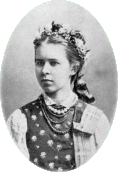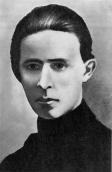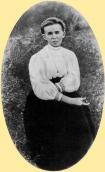Biography
Lesja Ukrainka – pen name of Larisa Petrovna Kosach (Kvitka) (13 (25).02.1871 – 19.07 (1.08).1913), a great Ukrainian poet and playwright.
Lesja was born in a family of Ukrainian intellectuals Peter Antonovich Kosach and Olga Kosach (of the genus Dragomanov). Peter – a lawyer by profession, a graduate of the Kiev University, most of his life serving in the Volyn province institutions for farmers. He was a member of the Kiev "Old community", where he met Michael Dragomanov and his younger sister Olga.
Lesja was born in Zvyagel (Novograd-Volynsky); in 1879 the family moved to Lutsk, and in 1882 – to his own estate in the village Kolodjazhne near Kovel. Kolodjazhne where Lesja was formed as a person, she thought her homeland.
Already in early childhood evident in the life of Lesja two important features – her illness and her extraordinary abilities.
Diseases. Lesja was born very sickly and then everything looked frail. In the family lovely called her Zeya (thin stalk). In 1880, she appeared signs of chronic disease that nobody can determine for long time. It turned out that it is very annoying tuberculosis of bone (coxilis). 11.10.1883 Lesja was done surgery on the affected bones of her left hand, but soon found out that also struck the bones of the right leg.
Pain in the leg, then quiet down then become stronger, intolerable, Lesja pursued until 1899, when she visited Berlin and made a successful surgery. Recovered after that, Lesja was able finally to go easily.
Since the end of 1907 Lesja showing signs of renal tuberculosis. The only facility with this disease were climatic treatment in Egypt, where Lesja stayed winter seasons 1909 – 1910, 1911, 1912 – 1913. These were palliative measures that slowdown disease progression, but could not stop it. In a state of extreme exhaustion from poor kidney function Lesja faded 43-year life in the town Surami in Georgia.
Abilities. Already in early childhood Lesja revealed her extraordinary abilities (she can be named Wunderkind). It is too early learn read and at the age of five years, wrote her first letters to Geneva, to the family of his uncle Michael Dragomanov. At the age of nine she wrote her first poem, "Hope", in 13 years she had printed two poems. These works appeared under the pseudonym "Lesja Ukrainka", which was offered by her mother. In 14 years, Lesja – author of two published translations of Gogol and her first poem "Mermaid".
Lesja loved music and had a great ability to play the piano. She could not develop it due to illness of hands.
By reason of same illness Lesja never had the opportunity to attend school and absorbed the knowledge of the mother, private teachers and constant reading of books.
Lesja had a wonderful talent for languages and said that apparently there is no sound, she could not utter. She spoke fluent Ukrainian, Russian, Polish, Bulgarian, German, French and Italian, wrote her works in Ukrainian, Russian, French and German, translated from Greek, German, English, French, Italian and Polish. She knew the Latin language, and during her stay in Egypt started to learn Spanish.
Excellent language skills opened up her all wealth of European literatures, the novelty of which she was able to read the original.
Creativity. The main theme of Lesja Ukrainka's creativity – a national liberation struggle of the Ukrainian people, confidence in the inevitable victory in this fight. Starting from early works such as the poem "Samson" (1888) and the poetic cycle "Tears – Pearls" (1891), due to the high pathos of "Slave songs" (1895 – 96) – up to "Triptych" and "Orgy" (1913), completed in the last year of her life – Lesja Ukrainka give more and more images of uncompromising freedom fighters – against the tyranny of any kind.
This political poetry has never been campaigning tailored exclusively to the needs of the traveling minute. Without giving any advice about the program and tactics of revolutionary struggle, about specific ways of implementing the ideals of freedom, and even without mentioning the word "Ukraine" Lesja showed romantic picture of the struggle.
From whatever area she take themes of stories – or ancient Egypt ("At home of slavery", 1906), or the history of the ancient Jews ("In captivity", 1903, "In the ruins", 1904), or from the time of early Christianity ("Rufin and Priscilla", 1908, "Attorney Martian", 1911), or from the European Middle Ages ("Robert Bruce", "The ancient tale", 1893) – everywhere we see clearly outlined goodies personification of courage, integrity, devotion to the ideals. And one can see the camp of despots, brazen for impunity, the personification of violence, depravity and demoralization. The collision of these forces, in accordance with the rules of romanticism, often ends in tragedy, but death of heroes Lesja Ukrainka always turns in necessary step to victory.
The main sources of Lesja Ukrainka's creativity were her inner feelings and literary impressions (on which based the above works). Her feelings were reflected in a number of brilliant lyrical poetry, from the early cycle "Starry Sky" (1891) – until the cycles "Spring in Egypt" (1910) and "From the traveler book" (1911), written in the full bloom of her talent. From the same source derived some others of her works, such as the story "Loud strings" (1897).
Instead, observations of modern life, which of course is the source of the writer's work, had to Lesja Ukrainka less significant, although her works such as the novel "Single son" (1894) and the story "Over the sea" (1898) derived from that third source.
Stylistic searches of Lesja Ukrainka was not limited to romanticism: one can see her work in a spirit of decadance ("Light Blue Rose", 1896), realism (already referred to "Single son", "Over the Sea", "Amicability", 1905) and even pure aestheticism without distinct ideological orientation ("Forest Song", 1911). However romantic style has always been dominant in her work.
Translations. Back in 1889 in the letter to her brother Michael Lesja Ukrainka outlined an extensive program of translations of world literature in Ukrainian. Under this program, she translated the works of Heinrich Heine – "Book of songs" (1890), a poem "Atta Troll" (1893) and other poems. Among her translations – hymns of the "Rig-Veda" (1890), poetry of Ancient Egypt (1910), attempts translations of Homer, Dante, Shakespeare, Byron.
The ideological orientation of Lesja Ukrainka's translations is best evidenced by her work on the drama by G. Hauptmann "Weavers" (1900), the theme of which is the workers' uprising in Silesia in 1844.
Folklore. Lesja Ukrainka during all her life interested in Ukrainian folklore. She knew a lot of folk songs (about 500) and was an outstanding folklore carrier. First of folklore work – "Midsummer in Volyn" – published in 1891, and the last major cycle of songs with her voice recorded her husband K. V. Kvitka in 1913.
Lesja Ukrainka and Clement Kvitka were the first Ukrainian folklorists, who began record on the phonograph singing folk performance. In 1908, Lesja has provided from her small amount funds (300 rubles) for Filaret Kolessa, allowing him to record a lot of poems for his fundamental publication.
Public activity. Since in the Russian empire any public activity was prohibited, any attempt in this direction became illegal and revolutionary. In 1897 – 1900 years Lesja Ukrainka translated in Ukrainian language works of European social-democratic literature to provide material for self-education for Ukrainian Social Democratic circles.
The period of most active participation in the revolutionary movement falls on the 1902 – 1903 year, when, being in San Remo (Italy), Lesja Ukrainka was in correspondence with Felix Volkhovsky in London and Michael Kryvynjuk in Prague. The subject of the correspondence was printing of illegal literature, from which came to us translating "The Tale of Tsar Simeon". At this time Lesja Ukrainka preparing work entitled " Our lives under the kings Moscow ", which is now found.
After the revolution of 1905 there were rised some legal opportunities for social work. In June 1906 Lesja Ukrainka was elected to the Board of Kiev "Enlightenment" society, where she took care of the library. That her operations in November 1906 attracted the attention of the royal gendarmerie: the opening of a public library was denied, and participation of Lesja Ukrainka in "Enlightenment" was seen as compromising fact for Lesja personally and for the whole organization.
The logical consequence of these studies was the arrest of Lesja Ukrainka (17 – 18 January 1907) by gendarmerie, and in the future – and the closing of the "Enlightenment".
After 1907 Lesja Ukrainka for family reasons and progressive disease had to live mainly outside Ukraine, and was unable to once take part in public affairs. At this time it focuses on the main goal of her life – poetry.
Heritage. Over her life Lesja Ukrainka managed to print separate editions of three collections of poetry: "On Wings of Songs" (Lviv: 1893), "Thinking and dreams" (Lviv: 1899)", Repercussions" (Chernivtsi: 1902). In Kiev in 1904 was published a book of selected poems, entitled "On the Wings of Songs", much battered by Russian censors; in 1911 Kiev publishing house "The Bell" released the first volume of the works, which appeared also the last.
The next stage of the study of Lesja Ukrainka's inheritance falled for 1920 – 1930 years. At this time were printed Works in 7 volumes (1923 – 1924, ed. K. V. Kvitka) and in 12 volumes (1927 – 1930, ed. B. Jakubsky, not completed). These publications were made by Ukrainian patriots and they are still of a great value.
This stage was roughly breaked by controlled from Moscow political repressions. All participants of studios were destroyed or prevented from working in the specialty.
So the next Soviet stage (1950 – 1991 years) started as if from scratch. It was carried by the brand new people who did not receive any inheritance from the previous stage, and even the mention of previous researchers were carefully cutted. At the time it was published coleeted works in 5 vols (Kyiv: 1951 – 1956), in 10 vols (Kyiv: 1963 – 1965) and 12 volumes (Kyiv: 1975 – 1979). Despite hostile anti-ukrainian management and political censorship, these editions still contained something new, previously unknown to the legacy of the poet.
The fourth stage of mastery of Lesja Ukrainka's heritage began in the time of independence (1991) and continues today. At this stage, the main focus was talk of the need to issue a new edition of the works in 16 volumes (but as of 2014, no letter of this publication has not been published).
At the same time was launches our electronic editions of Lesja Ukrainka, which is currently the most complete and best processed products. This edition contains many technical and meaningful innovations and can serve as a model for modern publications of other authors, such as , , and .
M. Zh., May 26, 2014.



